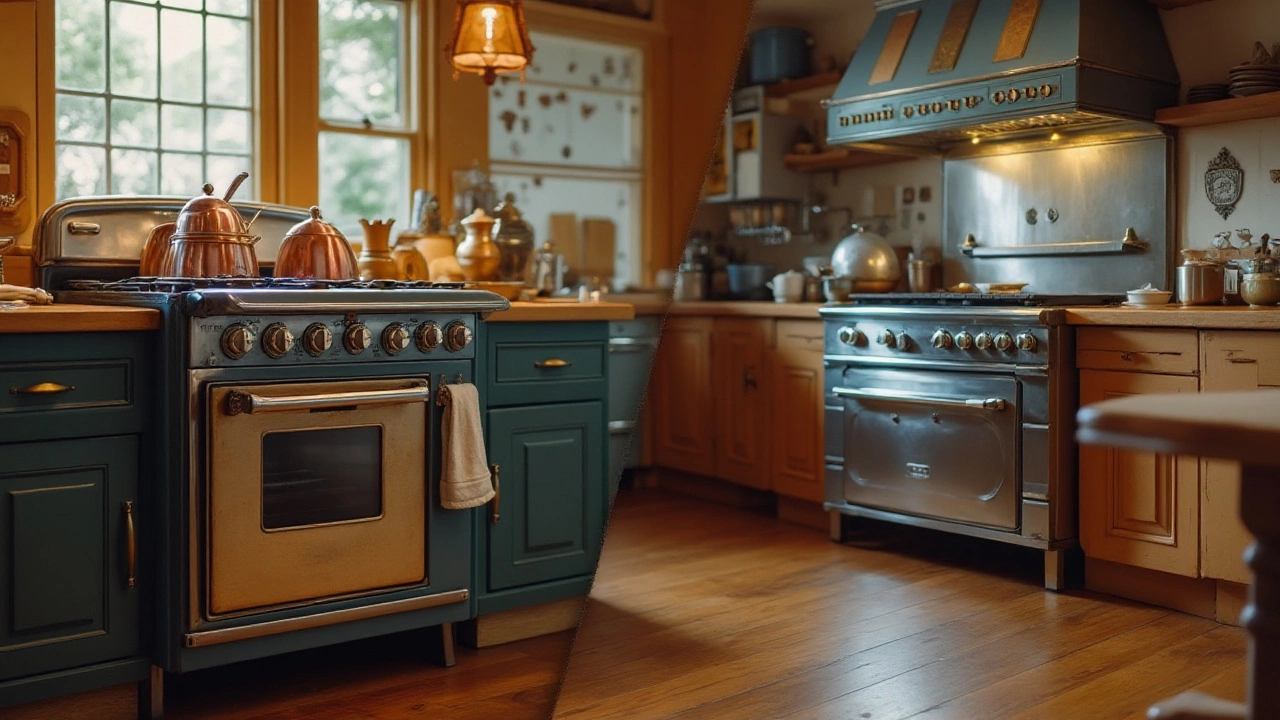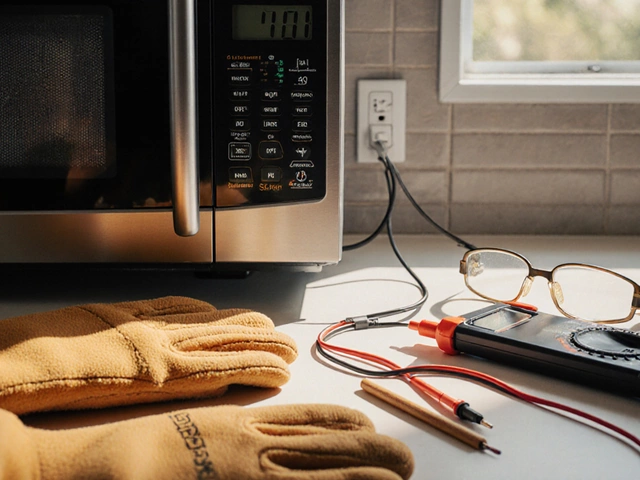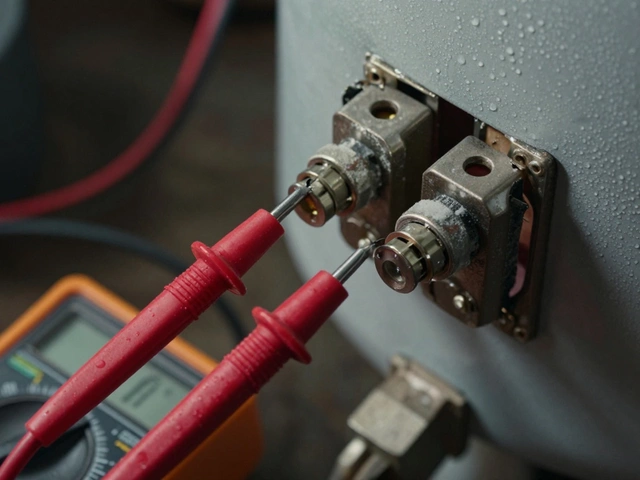Ovens are the kind of household appliance that seem to hum along quietly, blending into the background of our daily routines until they decide to pull a vanishing act just when you're in the middle of baking the perfect lasagna. When they do falter, many of us are left with a fundamental dilemma—do we try to mend the machine we know, or do we venture into the appliance market anew?
With the festive season looming, and countless meals yet to be cooked, understanding the nuances between repair and replacement can save more than just your sanity. It’s about finding what best fits both your culinary needs and your wallet. Let's break it down and see what makes fixing or swapping your oven the right move for you.
- Signs Your Oven Needs Attention
- When Repair is the Sensible Option
- Considerations for Replacing Your Oven
- Useful Tips for Oven Longevity
Signs Your Oven Needs Attention
Ovens are, arguably, the unsung heroes of the kitchen, silently toiling away to bring your culinary creations to life. But like any trusty companion, they too, can have their off days. If your oven begins to misbehave by cooking unevenly or refuses to reach the right temperature, it could be signaling an issue. For instance, if you're finding that one side of your cake is turning a golden brown while the other side is still looking half-baked, it might be a sign of a faulty heating element. These elements can wear out over time or suffer damage, impacting the oven’s ability to distribute heat evenly. Such imbalances are not only frustrating but can lead to waste as perfectly good ingredients hit the bins.
An oven which takes longer than usual to preheat, or seems to never quite reach the temperature you need, could also be crying out for help. This might suggest the thermostat, a small but crucial component, is no longer able to accurately measure and regulate temperature. Without a correctly functioning thermostat, baking a batch of cookies or roasting your Thanksgiving turkey can turn into a bit of a guessing game. A simple test with an oven thermometer can easily reveal if your oven's internal temperature matches what the display is reporting. If there's a significant variation, don't ignore it—it might be time for a closer look under the hood.
Another common sign of potential issues is unusual noises. While some ovens naturally emit low hums and clicks as they heat up, grinding, thumping, or screeching sounds are not normal. Such noises are often early indicators of electrical faults or worn-out motors, and it’s wise to heed these warnings sooner rather than later. Ignoring these may lead to more severe damage or, worse, pose safety risks.
John H. Mitchell, a seasoned home appliance repair technician, once remarked, "When your oven starts speaking to you—with bangs and clutters, take heed, for it may be telling you it’s due a bit of tender, loving care."
Unusual smells, especially those of melting plastic or burnt wiring, are obvious red flags. Besides signaling potential mechanical failures, they could also indicate short circuits, which might lead to a fire hazard if not promptly addressed. Keeping your nose attentive to such scents is as important as checking for visible smoke or sparks.
Furthermore, keep an eye on the oven door. A door that does not seal properly can leak heat, leading to poor cooking performance and energy inefficiency. The door's gasket, a typically rubber-lined seal, can deteriorate, requiring careful inspection and possible replacement.
When your oven behaves oddly, from uneven cooking to downright refusing to work, don’t wait for the issue to snowball. A keen awareness of these little distress signals can pave the way to sound maintenance decisions—be it opting for succinct oven repairs or considering a new purchase.

When Repair is the Sensible Option
Deciding to repair an oven can often feel like a leap into the unknown, but there are numerous reasons why fixing it could be the smarter choice. First and foremost, if your oven is under ten years old, it might still have plenty of life left in it. Most ovens are designed to last for around 10 to 15 years, so if yours is relatively young, getting it checked by a professional could extend its service significantly without impacting your finances too much. Discussing with an expert can also reveal if a specific part needs replacing, like a malfunctioning heating element or a broken thermostat, which are typically easy fixes for a technician.
Another factor to contemplate is the cost of repair versus replacement. A report from HomeAdvisor notes that the average cost for appliance repair is significantly lower than the price tag of a new oven, which can easily soar into the thousands, especially for high-end models. When you factor in the additional costs of installation and removal of the old appliance, repairs start to look even more appealing. If the repair costs are less than half the price of a new oven, many experts recommend going with the repair.
Apart from financial considerations, there's the issue of sustainability and environmental responsibility to ponder. Repairing an oven contributes less to the waste problem that is becoming increasingly critical across the globe. Reducing the amount of discarded electronics is a step towards a more sustainable lifestyle that minimizes environmental impact. According to the U.S. Environmental Protection Agency, only around 15-20% of e-waste gets recycled, meaning anything we can keep out of the landfill counts immensely towards conserving resources.
Sometimes the ties we have to our appliances are emotional. Perhaps your oven has been a constant since you first stepped into your kitchen, or it was a cherished gift. Repairing what you have can be more than a monetary decision; it's about preserving those connections and memories. Rather than parting ways with a trusted appliance, consider how a repair can not only mend your oven but also refill your kitchen with a legacy of culinary tales.
"The art of maintenance is about seeing value in what you have, preserving it, and ensuring it continues to serve you well," says technician and repair advocate John Stevens from the International Appliance Reparability Consortium.
Taking the time to assess and remedy your oven’s issues can have those thoughtful layers, all while being a sufficiently economical decision. The combination of cost-efficiency, environmental impact, and sentimental value makes repair a compelling option that shouldn’t be overlooked. In a fast-paced world of disposable culture, there’s a unique satisfaction in knowing that fixing things, like our beloved ovens, is sometimes the right solution.

Considerations for Replacing Your Oven
The decision to replace your oven isn't something to take lightly, given the financial outlay involved. So, what key factors should influence this choice? Age is a major player here. If your appliance is climbing toward or over the 15-year mark, it's often more prudent to bid it farewell. Older models not only lack the energy efficiency of newer designs, but parts can become a treasure hunt due to discontinuation. Repairs on an aged device can become a recurrent nightmare, both in terms of cost and inconvenience. Let’s not forget potential safety hazards that come with older electric or gas ovens.
Technological advancements in new ovens are another factor luring many toward replacement. Modern ovens bring innovative features like convection cooking, smart connectivity, and self-cleaning mechanisms that could revolutionize your kitchen routine. For those with a penchant for precision, temperature probes and programmable settings can turn a good cook into a culinary artist. The improved efficiency also means you often save money in the long term through reduced energy bills, making the hefty upfront investment somewhat easier to swallow.
"A modern oven's operational efficiency can cut energy costs by up to 30%," says Tom Watts, an appliance expert at KitchenPro Magazine.
But money isn’t everything. It’s equally important to consider how a replacement will mesh with your current kitchen setup. Are you planning a remodel, or is your oven a standalone swap? Size and design compatibility with existing cabinetry and countertops must be factored in, because nothing is more disheartening than an appliance that doesn't fit its new home. Installation costs shouldn't be overlooked either—professional setup ensures safety and optimal performance but can add a surprising amount to your total expenditure.
As you ponder a new oven, remember the real needs of your household. If your kitchen hosts a throng of hungry guests during the holidays, or you bake batches of birthday cakes, the reliability of a new model might just outweigh the alternative of patching up an older one. Yet, for those frequently on the road or reliant on takeout, spending less may be more advantageous. Reflecting on your cooking habits helps ensure your decision aligns with the way your home truly operates.
Replacement really shines when old appliances stop supporting your cooking aspirations. The humble oven, an underestimated powerhouse of the kitchen, when chosen correctly, should inspire the creation of memories and masterpieces alike. Thus, whether you're setting your sights on the latest model with smart features or just a trusty workhorse, make a choice that complements your life, not just your budget.

Useful Tips for Oven Longevity
Ensuring your oven has a long and productive life is not just about luck; it involves a combination of care, maintenance, and knowing how to troubleshoot minor issues before they become major problems. With that in mind, there are several actions homeowners can take to keep their ovens running smoothly. First and foremost, regular cleaning is key—an oven that is gummed up with burnt food and grease has to work much harder to maintain the right temperature. Make it a habit to clean up spills as soon as the oven cools down enough to do so safely. Most modern ovens come with a self-cleaning feature, but using this sparingly is wise as the extreme heat puts stress on components. Instead, use a gentle soap and warm water for routine cleanups.
Next, always inspect the door gasket for wear and tear. A damaged gasket allows heat to escape, forcing the oven to work harder and reducing temperature regulation efficiency. Replacing a worn gasket is a simple and cost-effective fix that can prevent overheating and ensure both energy efficiency and effective cooking. Additionally, regularly check the oven racks for any bends or breaks—this could be a sign that they need replacement to avoid uneven cooking and potential accidents. It's easy to overlook these smaller components of your oven, but they play a critical role in the smooth operation of the appliance.
One area often neglected until it's too late is the oven's exhaust system. Ensuring the vent is unblocked and operating efficiently is paramount for the appliance's longevity. Does your oven furnish weird smells or smoke when you cook? It could be because of clogging in the exhaust line. The accumulated film not only affects air circulation but can also be a fire hazard. Regularly cleaning the exhaust removes this risk and helps maintain a safer kitchen environment.
It's also important to occasionally check in with a professional maintenance service, particularly if you're noticing odd noises or temperature fluctuations you can't fix yourself. The best way to extend your oven's life is preventative care. As American kitchen expert Jeffrey Steingarten once said,
"The time spent on maintaining and understanding your tools of the trade is never wasted, for they will always repay the favor through reliability."For those who are particularly handy around the house, keep your manual close by to understand how to safely reset or replace parts like the thermostat, which can easily be replaced at home with a little guidance and attention to detail.
Avoid slamming the oven door shut as this can loosen connections or even damage the thermostat over time. Consider this: gentle handling of the door can prolong the device's effective capabilities. This applies to the knobs and controls as well; while the tactile feedback might feel satisfying, rough usage will gradually wear down their functionality, leading to potential control issues that can affect not only convenience but also how well your dishes are cooked.
In an age where appliance cost is not merely about sticker price, but also resounding effects on energy consumption, paying attention to these maintenance steps can yield longer lasting appliances and more savings in energy bills. By investing some time today, you're ensuring your trusted kitchen companion continues delivering delectable dishes without interruption. Remember, longevity isn't just a bonus; it's an integral part of what makes an oven not just an appliance, but an enduring cornerstone of your kitchen.







